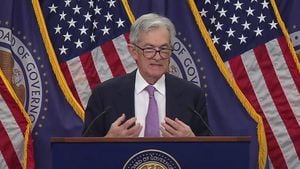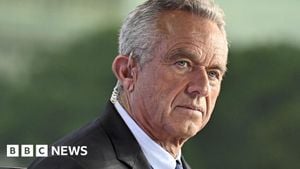Donald Trump’s nomination of Pete Hegseth as the next U.S. Secretary of Defense has stirred quite the controversy, primarily due to troubling allegations surrounding his past and his connections to extremist ideologies. Hegseth, previously known for his role as a Fox News anchor and his military background, finds himself at the center of scrutiny as new details emerge about his suitability for such a high-stakes position.
Hegseth’s nomination raises alarms not only because of his military service but also due to past incidents and allegations, including claims of association with extremist ideologies likened to white supremacy. A tattoo featuring the phrase 'Deus Vult,' which is linked to certain extremist movements, has been noted by members of the military community as raising red flags about Hegseth’s views and integrity.
On November 15, 2024, the Associated Press released previously hidden details concerning Hegseth’s military record. A service member identified their colleague as “potentially” posing an “insider threat” due to this tattoo. An email disclosed by the AP quoted concerns about Hegseth’s tattoo potentially being associated with white supremacist groups. The phrase itself, which translates to "God wills it," has been adopted by far-right groups, thereby complicate Hegseth’s nomination.
What’s even more concerning is the history of Hegseth’s association with extreme views within the military. He was once cited as part of the National Guard unit barred from providing security at President Joe Biden's inauguration. Hegseth himself has claimed this was due to his tattoo and purported views, which have also shaped perceptions about his alignment with nationalist groups.
Hegseth’s critics argue these factors indicate he may not embody the values necessary for leading the Department of Defense. Many question if he has the temperance and judgment required to oversee the nation’s military at this tumultuous time.
The sexual assault allegations from 2017 also complicate his nomination. Hegseth faced accusations of misconduct from his time at the Hyatt Regency Monterey Hotel during a convention. While he was reportedly cleared of wrongdoing and no charges ensued, the incident surfaced just days after his nomination, raising eyebrows. Trump’s team appears to have been caught off guard by the detailed allegations presented to them, indicating possible flaws in their vetting processes.
A high-ranking official revealed their frustration, noting, “There’s a lot of frustration around this. He hadn’t been properly vetted.” The overall sentiment among members of Trump’s transition team signals concerns not merely about Hegseth’s past actions but also about the wider implications of his leadership as Secretary of Defense.
Following his nomination, concerns continued to mount as more revelations came to light. The Washington Post reported multiple complaints tied to Hegseth, hinting at more damning information potentially surface. Vetted by the voices of unyielding critics, doubts hover over whether Trump's team can effectively navigate these troubling matters and defend Hegseth’s nomination amid public scrutiny.
Hegseth himself has addressed the controversies during interviews, insisting he is not affiliated with any extremist ideologies and attacking the media for what he perceives as unfair characterizations of his past. He has shown valor during military service and has even claimed to possess the credentials befitting the role he has been nominated for. After all, Hegseth is not only a veteran but also holds degrees from Ivy League institutions like Harvard and Princeton.
Hegseth’s past military positions, including serving as the commander of the National Guard troops assisting local law enforcement during civil unrest, have drawn both praise for his dedication and criticism for his tactics—questioning if he plays politics with defense governance.
Trump publicly endorsed Hegseth and articulated his confidence, describing Hegseth as “tough” and “smart,” emphasizing his loyalty to the 'America First' agenda. He stated, “With Pete at the helm, America’s enemies are on notice – Our Military will be Great Again, and America will Never Back Down.” Such statements from the President-elect only amplify the divide within political factions about the appropriateness of Hegseth’s appointment.
The pushback from within the Republican Party about Hegseth’s leadership is notable. U.S. Senator JD Vance, for example, labeled the media’s exploration of Hegseth’s tattoo as evidence of “anti-Christian bigotry,” arguing it unfairly attaches prejudice to the candidate and ignores any evidence to the contrary. This stance offers insight not just on support for Hegseth but also indicates potential partisan spins on contentious topics surrounding nominations.
With intense debate swirling and the Senate gearing up for hearings, Hegseth’s nomination faces hurdles far steeper than standard protocol. Senators are likely to assess not just his military credentials, but also the integrity and the public trust he is presumed to uphold as head of one of the most pivotal departments of the federal government.
Modern military leadership demands accountability, not only internally with the Department of Defense but also to the public who relies on these leaders to represent the nation's best interests without bias. The intersection of Hegseth’s past and the present requires careful consideration.
Looking forward, the concerns held by the military community resonate beyond simply Hegseth and impact the broader spectrum of acceptance and representation within the armed forces. The revelations surrounding Hegseth have prompted questions about the ideological compatibility of military leaders and whether they can embody the values of integrity and justice required for their roles.
The nomination and its accompanying chorus of dissent reflect significant cultural divides characteristic of contemporary American politics. With political affiliations overlapping heavily with beliefs and societal values, the impact of Hegseth’s potential confirmation as Secretary of Defense will raise moral questions about the persona the country seeks to represent on the world stage.
The upcoming confirmation hearings will undoubtedly shed light on Hegseth’s qualifications and past, but as concerns grow about extremist affiliations and past misconduct, the ramifications of this appointment will be closely observed. Hegseth must navigate the murky waters of public scrutiny and self-defense to maintain his standing as Trump's pick for defense.
Trump’s cabinet picks continue to invoke heated discourse, and as historians observe, this dynamic could define his administration's military ethos as battles rage over identity and representation influence behaviors on the battlefield.



